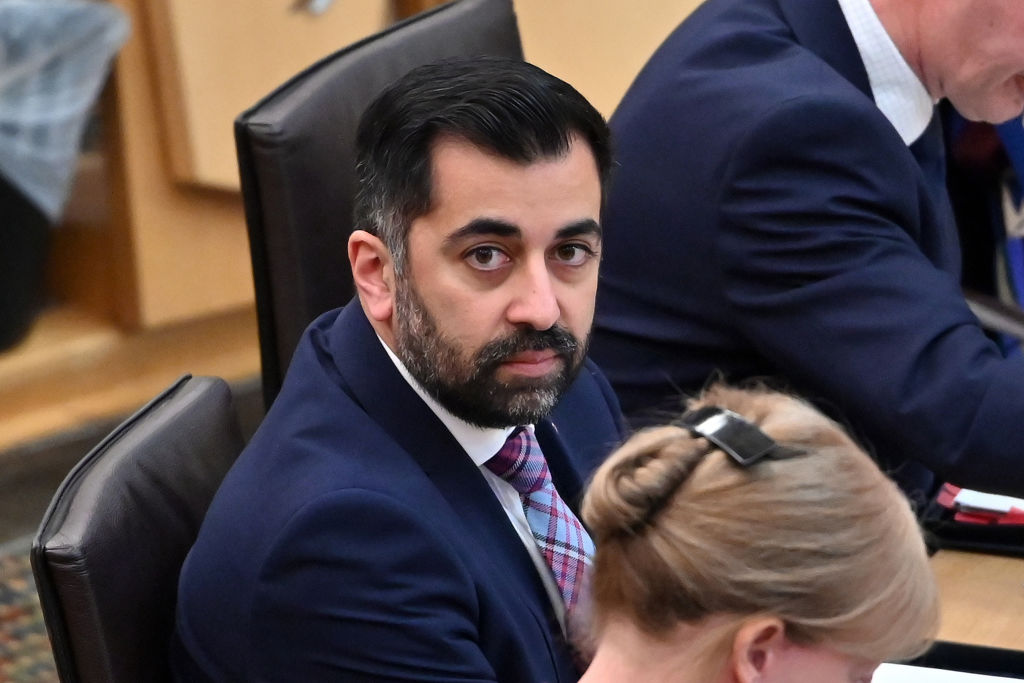The leader of a governing party that seems to be spending most of its time helping police with their inquiries would, you might have thought, be a little wary of launching one of the most radical changes to the justice system in 800 years – but not Humza Yousaf. The politician who gave us the illiberal Hate Crime Act, which makes ‘stirring up hatred’ even in the privacy of one’s home a criminal offence, is now threatening to abolish jury trials in Scotland.
Since Magna Carta was issued in 1215, those accused of serious crimes in Scotland have had the right to be judged by a panel of their peers, but perhaps not for much longer. The SNP’s Victims, Witnesses and Justice Reform (Scotland) Bill will pilot judge-only courts for sexual offences.
The low conviction rate may simply be because rape cases are often extremely difficult to prosecute – ask anyone who has been a juror in such a case.
God help the poor defendant who draws the short straw and appears before one of these courts – because the whole point of them appears to be to increase the rate of convictions. Specialist courts for sexual offences is the brainchild of Lady Dorrian, the second most senior judge in Scotland. She presided over the most famous political trial in modern Scottish history when the former First Minster, Alex Salmond, was acquitted on 13 counts of attempted rape, sexual assault and indecent assault.
Rape Crisis Scotland, which receive large sums from the Scottish government, was appalled. Interestingly, its CEO Sandy Brindley had long been lobbying Nichola Sturgeon to have juries removed from trials involving rape and sexual assault. Campaigners also want to see the ambiguous ‘not proven’ verdict removed from Scots law, which they think gives jurors a ‘get out’ clause when they should be delivering a guilty verdict. They also want lifetime immunity for ‘victims’ even if they prove to be unreliable. Yousaf has delivered on all counts.
His justice bill is based on the findings of Lady Dorrian’s review of sexual offences published in 2022 which concluded that ‘rape myths’ linger amongst jurors. Other academic research suggests that belief by juries in rape myths is a myth. But only 46 per cent of rape cases are successfully prosecuted in Scotland compared with 88 per cent of criminal cases, so Dorrian has called for a pilot of judge-only courts to see if they could deliver a better ratio.
However, the assumption that juries are blinded by a culture of heteronormative capitalist patriarchy, which is what some academics believe, is dubious. The low conviction rate may simply be because rape cases are often extremely difficult to prosecute – ask anyone who has been a juror in such a case. Scottish lawyers see them day in day out and many are horrified by the SNP’s justice bill.
The chairman of the Scottish Criminal Bar Association, Tony Lenehan KC, said that abandoning this cornerstone of the Scottish justice system is ‘to subscribe to a doctrine of zealots’. The Law Society of Scotland agrees and sees ‘no benefit’ in scrapping juries. Thomas Ross, KC, a leading advocate, took to social media to urge fellow lawyers to ‘take no part in legitimising non-jury trials’. He argues that judges, sitting alone, would be influenced by political pressure and public opinion and could face ‘witch-hunts’ when they don’t convict.
In the Salmond trial the media portrayed the former first minister as a monster quoting prosecution witnesses and largely ignoring the defence case. Yet, Salmond was acquitted on all charges by a jury of eight women and five men. They heard the complainants at length. It was a considered decision taken by people with no axe to grind who were under no pressure either way. Indeed, because accounts of Salmond’s alleged sex offences had already been leaked to the Daily Record, they should if anything have been ‘conditioned’ to convict.
Randomly selected jurors are independent and anonymous. They – and only they – hear the full story. Yet throughout the ages elites have sought to abolish jury trials because they think ordinary people are not capable of understanding complex law. Indeed, if juries are abolished in rape trials, what is to stop them being abolished for all sexual offences? How can people ‘subject to rape myths’ be trusted to try coercive control or voyeurism?
This Scottish government is trying to groom Scotland into accepting the abolition of the most fundamental right in our justice system. They have bundled jury-less trials into a bill with other changes including abolition of the ‘not proven’ verdict , which even many lawyers think is unsafe because it amounts to a verdict of ‘not guilty but don’t do it again’.
Jurors in a criminal trial are told that the prosecution must prove ‘beyond reasonable doubt’ that the defendant is guilty. In many rape trials that test is almost impossible, which is why there is pressure effectively to abolish it: to allow judges to increase the conviction rate. That is not justice. And you can be sure that if any of the SNP figures currently under investigation by police are charged with a serious criminal offence they will insist on a fair trial by 15 men and women, not a judge sitting in the full glare of public wrath and political pressure.







Comments